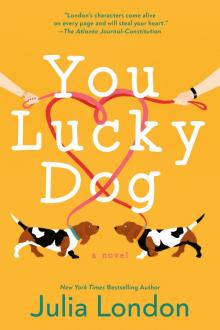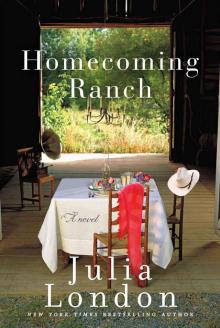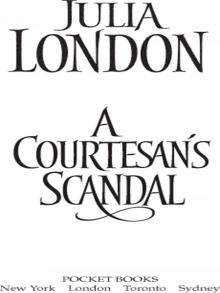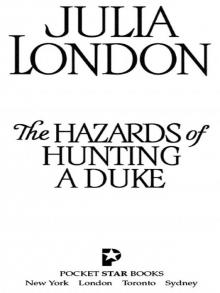- Home
- Julia London
Homecoming Ranch
Homecoming Ranch Read online
ALSO BY JULIA LONDON
HISTORICALS
The Devil’s Love
Wicked Angel
The Rogues of Regent Street
The Dangerous Gentleman
The Ruthless Charmer
The Beautiful Stranger
The Secret Lover
Highland Lockhart Family
Highlander Unbound
Highlander in Disguise
Highlander in Love
The Desperate Debutantes
The Hazards of Hunting a Duke
The Perils of Pursuing a Prince
The Dangers of Deceiving a Viscount
The School for Heiresses (Anthology): “The Merchant’s Gift”
The Scandalous Series
The Book of Scandal
Highland Scandal
A Courtesan’s Scandal
Snowy Night with a Stranger (Anthology): “Snowy Night with a Highlander”
The Secrets of Hadley Green
The Year of Living Scandalously
The Christmas Secret (novella)
The Revenge of Lord Eberlin
The Seduction of Lady X
The Last Debutante
CONTEMPORARY ROMANCE AND WOMEN’S FICTION
The Fancy Lives of the Lear Sisters
Material Girl
Beauty Queen
Miss Fortune
Over the Edge (previously available as Thrillseekers Anonymous series)
All I Need Is You (previously available as Wedding Survivor)
One More Night (previously available as Extreme Bachelor)
Fall Into Me (previously available as American Diva)
Cedar Springs
Summer of Two Wishes
One Season of Sunshine
A Light at Winter’s End
SPECIAL PROJECTS
Guiding Light: Jonathan’s Story, tie-in to The Guiding Light
ANTHOLOGIES
Talk of the Ton (Anthology): “The Vicar’s Widow”
Hot Ticket (Anthology): “Lucky Charm”
The characters and events portrayed in this book are fictitious. Any similarity to real persons, living or dead, is coincidental and not intended by the author.
Copyright © 2013 DINAH DINWIDDIE
All rights reserved.
No part of this book may be reproduced, or stored in a retrieval system, or transmitted in any form or by any means, electronic, mechanical, photocopying, recording, or otherwise, without express written permission of the publisher.
Published by Montlake Romance
PO Box 400818
Las Vegas, NV 89140
ISBN-13: 978-1611099577
ISBN-10: 1611099579
Library of Congress Catalog Number: 2013936908
For Nancy
My hero, my best friend, my big sister
CONTENTS
ONE
TWO
THREE
FOUR
FIVE
SIX
SEVEN
EIGHT
NINE
TEN
ELEVEN
TWELVE
THIRTEEN
FOURTEEN
FIFTEEN
SIXTEEN
SEVENTEEN
EIGHTEEN
NINETEEN
TWENTY
TWENTY-ONE
TWENTY-TWO
TWENTY-THREE
TWENTY-FOUR
TWENTY-FIVE
TWENTY-SIX
TWENTY-SEVEN
TWENTY-EIGHT
TWENTY-NINE
THIRTY
THIRTY-ONE
THIRTY-TWO
THIRTY-THREE
THIRTY-FOUR
EPILOGUE
ABOUT THE AUTHOR
ONE
Pine River, Colorado
I’ll tell you this story because my brother, Luke, won’t. Even though it is more his story than mine. But you know how it is, the firstborns bask in the adoring light of being first, while younger brothers like me have to figure out where we fit in right from the get-go. Which means we tend to see the big picture while the firstborns see themselves. You younger siblings know what I’m talking about—we’re the glue and they’re the glitter, right? Although I can be kind of glittery, too. I’m an artist—I paint the canvas, I fill in the background of this family. I’m not bragging—it’s just fact.
Okay, so two words for how this story started: Grant Tyler.
He was a fun-loving, adventure-seeking, hard-driving, cigar-chomping, skirt-chasing kind of guy. He’d lost as many fortunes as he’d made in his sixty-plus years. He liked the idea of being married more than he liked being married, and, trust me, he didn’t get high marks from the ladies. Not like me, anyway—I’ve got killer game.
But Grant Tyler, he could always smooth things over somehow, because he was always hooking up with women. I know that from Dani Boxer. She runs the Grizzly Lodge and Café, and she comes around sometimes to have coffee with me and Dad. She’s awesome.
So anyway, Grant could smooth over the ruffled feathers of pretty birds, but he couldn’t smooth over the fact that he sucked at being a dad. I knew he wasn’t much of one way back because I went to school with his daughter, Libby Tyler. She sort of looks like him, but a whole lot better. She’s got these deep blue eyes and crazy curly, dark hair I always liked. I sat behind her in third grade and accidentally touched her hair and accidentally left some half-chewed Chiclets in it. Libby picked up her scissors and cut off a big lock of hair with the gum in it and put it on my desk. I think I kept it till fifth grade.
Anyway, I knew about Libby, but I didn’t know about the kid in California or the one in Florida. That’s right, ol’ Grant Tyler had three kids by three different women. All girls. And he forgot to pay his child support more than he remembered. He swore he never saw a recital or a soccer game. I bet he didn’t know what their favorite color was, or the name of the first boys to break their hearts, or what their dreams were, either. Not like my mom, who knew everything about us. My mom was the greatest mom ever. Except for the breast cancer, which was a deal-killer on the Mom of the Year award. That made her, like, not the best mom of the year because she checked out way before any of us were ready for her to go.
So when the end came for Grant Tyler—and it came at him fast and hard, just like he’d lived—he got a little religion and decided he needed to do right by his kids. Maybe he hadn’t been a good dad, but by God, he’d leave something for those kids to hold onto. Except his Porsche. He wanted to be buried in that Porsche. Can you believe that? Imagine yourself on your deathbed, and what you’re worried about is being buried in a car instead of what you were going to tell the Man Upstairs about all the stuff you’d done.
I know all of this part, because Grant Tyler announced it all to my friend Jackson Crane, his fourth and final business manager. Jackson claims he told his big corporate law office in Denver to screw it one day and came this way. He got on with Grant and worked nine months before the doc said Grant wouldn’t make it. Grant told Jackson to leave everything he had to his kids. Jackson was confused, and he said, “What kids?”
“My kids,” Grant said. “Madeline, Emma, and Libby.”
Like me, Jackson knew only about Libby, and he said he honestly believed Grant was confused with all the drugs they were pumping into him, so he repeated, “Madeline and Emma?”
Grant, who had tubes coming out of every orifice, cocked his head to one side and studied Jackson as if he couldn’t make out how he could be so slow, sort of the way I look at Dad’s old pickup truck. He said, “Do I look like I want to do a lot of explaining right now? Listen up—I want to leave everything to them. All of it. Why the hell are you looking at me like that?”
I can picture
Jackson futzing with the knot in his tie like he does when people talk about things he doesn’t get. He also swallows a lot. He doesn’t have much of a poker face, if you know what I mean. He said, “That’s… admirable.” Admirable! Ha! “But as you know, your divorce from your fifth wife is pending. And it’s costing a lot of money.”
“Yeah, tell me something I don’t know,” Grant scoffed. “What about it?”
“It’s complicated,” Jackson said.
To which Grant laughed and said, “I hope you look that sad at my funeral, Mr. Crane. You ever been married? I’ll let you in on a little secret: It’s always complicated.” I guess Grant thought he was imparting the wisdom of the world, like he was the first guy to ever figure out that women are crazy and impossible to understand. “Go on, now, give it to me straight,” he’d said to Jackson. “Tell me how complicated it is. But don’t say the Porsche, ’cuz I ain’t leaving it. Have you found out who can bury me in it yet?”
“Not yet. I’m working on it.”
“You must think I got all the time in the world. I need to get that nailed down. All right, so?” he’d said, and with his hand, he gestured for Jackson to speak.
I know this: Jackson doesn’t like it when people tell him to hurry up and talk. But he didn’t mind then because he said that the gesture of lifting his hand and waving it around wore Grant out, and Jackson knew then that Grant really was going to die. Jackson found his balls, I’m happy to say, and he told him, “You’re not going to have anything to give your kids when the divorce is finalized. You’re broke, Mr. Tyler. The only thing you’ll have left is Homecoming Ranch.”
“That’s all?” Grant asked, like he couldn’t believe that being the financial genius he was, he could have screwed things up that bad.
“That’s all,” Jackson said.
That was not what Grant wanted to hear. Hell, it’s not what I wanted to hear. The thing is, Homecoming Ranch is really complicated. It’s my home. It’s where Luke and I grew up. Dad believes Grant really meant to help him out when he gave him that piddling sum for Homecoming Ranch, but I don’t think so.
“Well to hell with it, then,” Grant said, and Jackson said he sank back against the pillows and that for once, he didn’t look so big. He looked pretty small and frail. “It’s the thought that counts, right?” Grant said, as if he was seeking some affirmation from Jackson that it was okay to totally screw over your kids. “Leave that to them.”
That should have been the end of it, but Jackson must have been really bothered by it, because he said, “You know you are upside down on the ranch’s mortgage. It’s more headache than legacy. You’re leaving them a big mess.”
But ol’ Grant chuckled and gestured to himself, lying in the hospital bed in one of those gowns that hardly covered him, with a bowl to catch his vomit on the table in front of him. “You think I ought to get out there and spruce the place up? Those girls will just have to turn it around if they want anything out of it, won’t they? It’ll be good for ’em. Builds character.” He’d grinned at Jackson. “It’s the best I got, Jackson. Now, write this down. Madeline Pruett, I think she’s in Florida, but you’ll have to do a little digging with that one. And then Emma Franklin or Tyler, I don’t know what the hell she’s going by these days. I’m ninety-nine percent sure she’s still in L.A. I ran into her mamma not too long ago. That gal is still a fox.” He’d actually paused to remember Emma’s mother fondly for a moment because that man was a dog to his dying breath. “And then there’s Libby,” he’d said with a sigh, and had nodded at the door. “She’s probably sitting outside the room right now.”
“She is,” Jackson said, and I think he was probably pretty pissed off at this point. He likes Libby. Hell, everyone likes Libby. Most everyone. I hear Ryan doesn’t like her much these days, but that’s another story for another day.
I digress.
Grant was annoyed that Libby was trying to be a good daughter. “Jesus H, can’t a man just die in peace?”
“I think she’d like to offer you some comfort in that regard,” Jackson said, and I can just picture his jaw clenched tight as his fist. “And it’s not like you’re going to die any minute.”
“You don’t know that,” Grant snapped. “Tell her to come back later. I got my comfort right here,” he said, and with some effort, fished a bottle of Jim Beam from beneath his pillow. He laughed at Jackson Crane’s expression, but his laugh quickly dissolved into a painful cough.
Yeah, the end came pretty hard at Grant Tyler.
I know it did, because I know everyone in town. My name is Leo Kendrick. Don’t let my good looks and charming personality blind you.
TWO
Orlando, Florida
Unreal.
It was the only word that came to mind, popping into her head in neon colors. A girl should never hear of her father’s death quite like she did, Madeline Pruett would tell her best friend Trudi a few hours after the fact. Especially when she didn’t even know she had a father. And what made it spectacularly unreal was that there were strings attached to her father’s death. Big strings. Enormous, bungee-cord-jump-off-a-bridge strings.
There was a long silence on the other end of the phone as Trudi took this news in. Madeline could hear Trudi’s two-year-old daughter in the background banging cups on the tile floor. Then Trudi said, “Are you going to soccer practice?”
It wasn’t exactly what Madeline would call “practice.” She volunteered with Camp Haven, an organization that mentored at-risk youth. Camp Haven sponsored afterschool soccer camps, and Madeline coached little five-year-old girls. Not that Madeline was an outstanding soccer player—she was mediocre. But the coaching challenge was getting the girls to run in the right direction. The payoff was spending time with them. “Yes, I’m on my way,” she said to Trudi.
“Okay, so here’s what you do. When practice is over, I’ll meet you at Paco’s Cantina. Order two gold margaritas. I’m calling Rick right now.”
Thank God for Trudi Feinstein, because Madeline really needed to repeat back the things the man had said about her father, to hear it out loud again, to make sense of it. She needed some moral support, someone to gasp and exclaim that it was all so unreal right along with her.
Madeline had tried to find that moral support from her mother when she’d called her just a couple of hours earlier, but Clarissa Pruett had cheerfully announced that she and some guy named John were about to go and “party” and to make it quick.
“Okay. My father died,” Madeline said.
“Huh? What do you mean your father died? Who are you talking about?”
In her mother’s defense, it was a legitimate question in a family of exactly two. Not that Madeline had lacked for dads—in her life, she’d been subjected to four that her mother had said she should call “Dad,” and that didn’t even count a few men in between. And quite obviously, Madeline had been produced with the help of an actual father. Turns out the one who had died was the absent sperm donor, the deadbeat the state could never track down to collect child support. Madeline had only one memory of him: a stack of gold chains around a thick neck, the reek of cigars, and a beefy hand with an endless supply of candy he dispensed like a broken gum machine. There was only one fuzzy picture of her parents—her mother with long hair, big floppy hat, a cigarette, and cocktail, and a man, whose face was partially obscured by her mother’s hat.
“My real dad, Mom,” Madeline said. “My sperm donor. He died.”
“Well, I’m sorry to hear that,” her mother said. Madeline heard the pop of a beer can over the cooking show blaring in the background from the enormous flat screen TV some man had bought her mother. Clarissa Pruett never actually cooked anything that Madeline could remember, but she watched that channel religiously.
“So how’d he die?” her mother asked before slurping from the can of beer.
The bigger question to Madeline was how did he live? Where had he been? It had not occurred to Madeline, in the shock of hearing about him a
t all, to ask how he’d met his demise. “I don’t know.”
“They didn’t say?”
“It wasn’t a they. It was one guy. Jackson Crane.”
Jackson Crane had shown up late to the realty offices where Madeline worked. She was the fairly new agent who always took the people who came in after the other agents had left for happy hour. It was a trick that had landed her a few good listings, including her prize, the DiNapoli house.
“Now who is Jackson Crane?” her mother asked. Madeline heard the sound of a lighter, the quick inhale of breath as her mother lit a cigarette.
“My father’s business agent or something like that,” Madeline said, and told her mother how the handsome, tanned man wearing a tailored suit coat and crisp white shirt open at the neck had walked into her office. He’d reminded her of one of those sitcoms where four guys live together in a loft and have hilarious girl troubles, and she’d even assumed he was looking for a new bachelor pad somewhere in Orlando. She told her mother how he’d shaken her hand vigorously, thanked her for seeing him, and then said, “I flew in from Colorado and came straight here,” and proceeded to announce that he had some unpleasant news about her father.
He’d said it with dimples and white teeth, as if his unpleasant news could be softened by a Crest toothpaste smile. Madeline had been suspicious of him—she was generally suspicious of all men—and had feared his was one of those awkward smiles people get when they hear bad news and they don’t know how to take it in. He clearly thought she would be very upset with hearing her father had died.
“I told him I didn’t have a dad.”
“I wish you wouldn’t say that, Maddie,” her mother said disapprovingly. “You make it sound like I was sleeping around. You obviously had a father.”
Madeline chose to skirt around the glaring truth that her mother had spent most of her life hopping from one bed to another. “Not everyone has a father, Mom. Some people only have a sperm donor.”
The absence of a father was the singular crack in Madeline’s life, the chasm she could never seem to avoid. It wasn’t that she dwelled on it, quite the opposite—she had made herself forget it a very long time ago. But inevitably, when she met new people, they would ask about her family, and she would end up explaining that she never knew her father, and, no, she never saw him but one time, never heard from him (never mattered to him, did not exist for him)—and she would have to relive the whole no-dad thing again. She much preferred not thinking about him at all.

 A Royal Kiss & Tell
A Royal Kiss & Tell You Lucky Dog
You Lucky Dog The Devil in the Saddle
The Devil in the Saddle The Trouble with Honor
The Trouble with Honor Tempting the Laird
Tempting the Laird The Secret Lover
The Secret Lover A Light at Winter’s End
A Light at Winter’s End The Charmer in Chaps
The Charmer in Chaps Homecoming Ranch
Homecoming Ranch Jack (7 Brides for 7 Soldiers Book 5)
Jack (7 Brides for 7 Soldiers Book 5) A Courtesan's Scandal
A Courtesan's Scandal Hard-Hearted Highlander--A Historical Romance Novel
Hard-Hearted Highlander--A Historical Romance Novel The Complete Novels of the Lear Sister Trilogy
The Complete Novels of the Lear Sister Trilogy The Last Debutante
The Last Debutante Suddenly Single (A Lake Haven Novel Book 4)
Suddenly Single (A Lake Haven Novel Book 4) Seduced by a Scot
Seduced by a Scot Highlander Unbound
Highlander Unbound Suddenly Dating (A Lake Haven Novel Book 2)
Suddenly Dating (A Lake Haven Novel Book 2) The Bridesmaid
The Bridesmaid The Seduction of Lady X
The Seduction of Lady X One Mad Night
One Mad Night Extreme Bachelor
Extreme Bachelor The Scoundrel and the Debutante
The Scoundrel and the Debutante The Revenge of Lord Eberlin
The Revenge of Lord Eberlin American Diva
American Diva The Lovers: A Ghost Story
The Lovers: A Ghost Story The Hazards of Hunting a Duke
The Hazards of Hunting a Duke Return to Homecoming Ranch (Pine River)
Return to Homecoming Ranch (Pine River) The Perils of Pursuing a Prince
The Perils of Pursuing a Prince Highlander in Love
Highlander in Love The Devil Takes a Bride
The Devil Takes a Bride Devil in Tartan
Devil in Tartan Wild Wicked Scot
Wild Wicked Scot Snowy Night with a Highlander
Snowy Night with a Highlander One Season of Sunshine
One Season of Sunshine Summer of Two Wishes
Summer of Two Wishes All I Need Is You aka Wedding Survivor
All I Need Is You aka Wedding Survivor Sinful Scottish Laird--A Historical Romance Novel
Sinful Scottish Laird--A Historical Romance Novel Suddenly Engaged (A Lake Haven Novel Book 3)
Suddenly Engaged (A Lake Haven Novel Book 3) Highlander in Disguise
Highlander in Disguise Suddenly in Love (Lake Haven#1)
Suddenly in Love (Lake Haven#1)